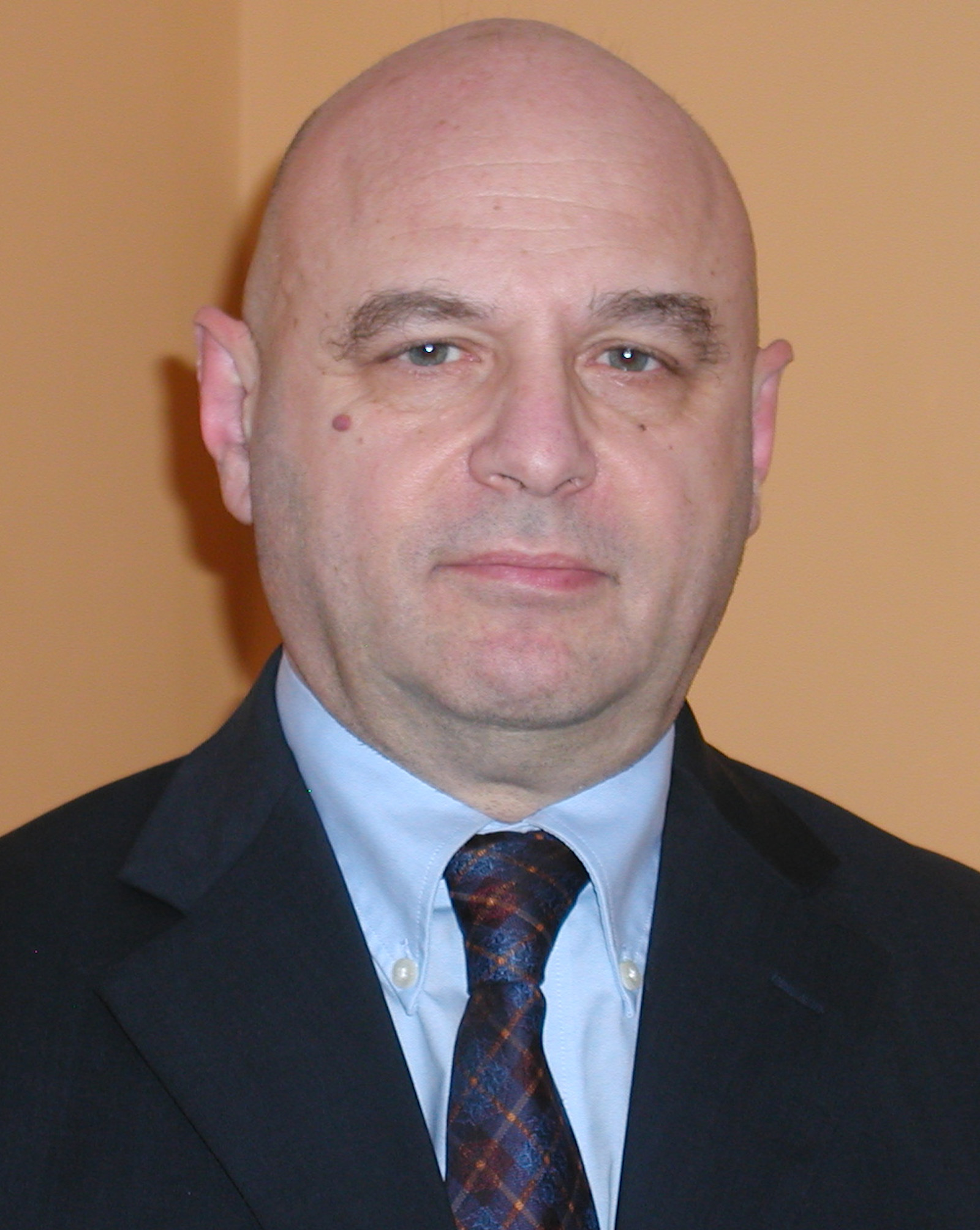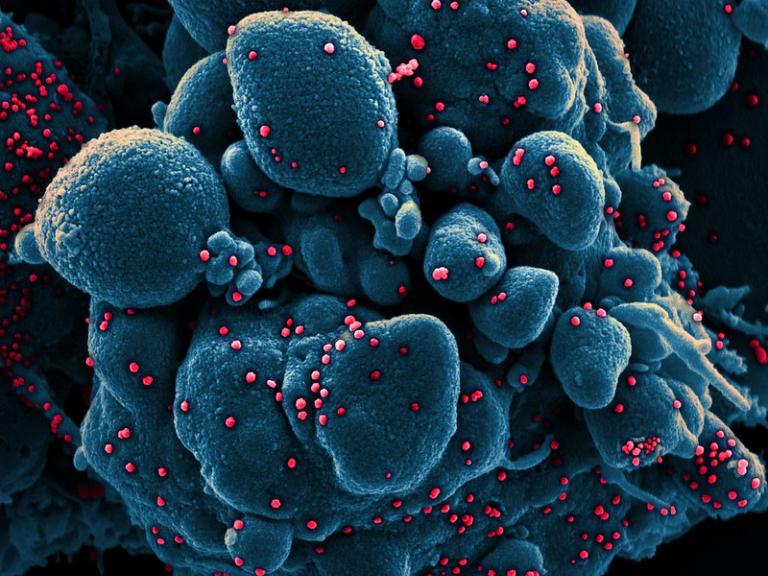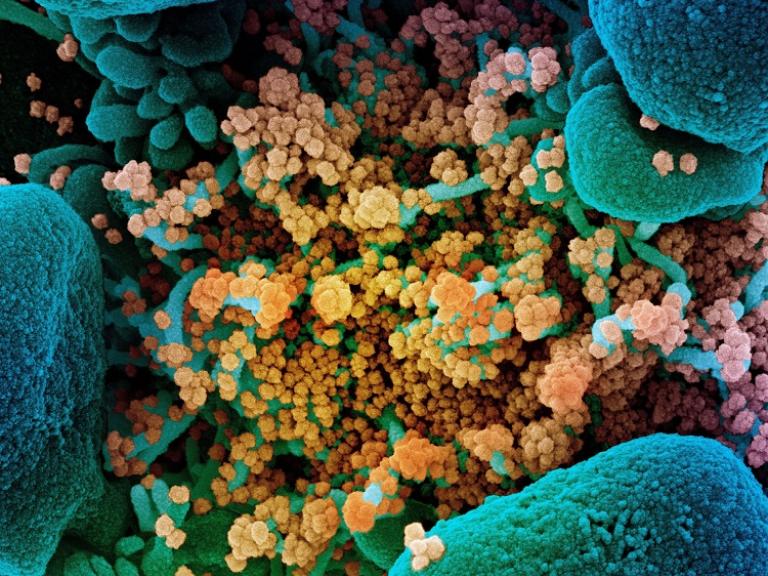Immune Deficiency Genetics Section
Established in 2016
Luigi D. Notarangelo, M.D.
Chief, Immune Deficiency Genetics Section
Deputy Chief, Laboratory of Clinical Immunology and Microbiology
NIH Distinguished Investigator
Specialty(s): Allergy and Immunology, Pediatrics Provides direct clinical care to patients at NIH Clinical Center

Highlights

Blood is collected from a newborn for screening.
Screening Newborns for Deadly Immune Disease Saves Lives
June 20, 2023
Widespread screening of newborns for a deadly disease called severe combined immunodeficiency, or SCID, followed by early treatment boosted the five-year survival rate of children with the disorder from 73% before the advent of screening to 87% since.

NIH Scientists Advance Understanding of Pediatric Immune Responses to COVID-19 and Rare Inflammatory Syndrome
February 18, 2022
A comprehensive analysis evaluating immune responses in children with SARS-CoV-2 infection and in those with a rare post-infection inflammatory syndrome called MIS-C has revealed distinct immunopathological signatures associated with each condition.

Scientists Discover Genetic and Immunologic Underpinnings of Some Cases of Severe COVID-19
September 24, 2020
Findings explain why some people with COVID-19 develop severe disease and may provide the first molecular explanation for why more men than women die from COVID-19.
Major Areas of Research
- Defining the molecular and cellular bases of novel forms of human inborn errors of immunity
- Understanding the mechanisms underpinning manifestations of immune dysregulation in patients with RAG deficiency and other forms of combined immune deficiency
- Defining the cellular and transcriptional diversity of thymic stromal and hematopoietic cells in health and disease both in humans and in mice
- Modeling pathological human T cell development in vitro
- Developing novel approaches to correct primary immune deficiency gene defects
- Analysis of the inflammatory response and composition of T- and B-Cell Repertoire and Mapping of Virus-Specific T-Cell Receptor Sequences in patients with COVID-19 and MIS-C
Program Description
The main goal of the Immune Deficiency Genetics Section (IDGS) is to characterize the molecular and cellular mechanisms underlying inborn errors of immunity, and combined immunodeficiencies (CID) in particular, with the ultimate objective of improving diagnosis and treatment of these conditions.
In addition to increased susceptibility to infections, patients with CID often manifest immune dysregulation, with autoimmune cytopenias and organ-specific autoimmunity. We study both patients with yet genetically undefined forms of CID and patients with known gene defects. In the former group of patients, we use unbiased genomic approaches (whole exome sequencing) and a wide array of cellular and molecular techniques (flow cytometry; in vitro assays to explore the function of T, B, and NK cells; high-throughput analysis of T- and B-cell repertoire; analysis of a broad panel of autoantibodies; generation and targeted differentiation of induced pluripotent stem cells) to identify novel gene defects. Using this approach, the laboratory has identified several new gene defects, including DOCK2 deficiency, TTC7A deficiency (responsible for combined immune deficiency and intestinal atresias), HOIP deficiency (a cause of immune deficiency and autoinflammatory disease), EXTL3 deficiency (associating severe T-cell immunodeficiency, skeletal dysplasia, and neurodevelopmental delay), PAX1 deficiency and SASH3 deficiency. By modeling human T-cell differentiation in an artificial thymic organoid system, our lab is interested in defining the stages at which T-cell development is blocked in patients with known and novel forms of severe combined immune deficiency. Furthermore, this system also allows to distinguish between hematopoietic cell autonomous and non-hematopoietic (mostly, thymus-intrinsic) causes of severe congenital T-cell lymphopenia.
We also aim to define the mechanisms underlying immune dysregulation in patients with CID of known genetic etiology. In this regard, the laboratory has a special interest in human RAG deficiency and in other defects of V(D)J recombination. Using a powerful in vitro platform, we have determined that the severity of clinical manifestations associated with mutations in the RAG, DCLRE1C, and LIG4 genes correlates with the residual activity of the mutant protein and with different degrees of perturbation of T- and B-cell repertoire diversity and composition. Ongoing work in the laboratory is focused on testing the hypothesis that hypomorphic mutations in the RAG genes that partially (but not completely) compromise T-cell development cause altered cross-talk with thymic stromal cells and by that mechanism also affect maturation and function of subsets of thymic epithelial cells involved in the process of negative selection of self-reactive T cells, thereby leading to increased risk of autoimmunity. These human studies are complemented by high-throughput sequencing of the T-cell repertoire, searching for molecular signatures of self-reactivity, such as increased frequency of clonotypes bearing cysteines and hydrophobic amino acids at the apex of the CDR3. We are also interested in defining the role of microbiome in the immune dysregulation associated with hypomorphic mutations in genes involved in the V(D)J recombination process. To this purpose, studies are conducted both in patients and in animal models of RAG deficiency that our lab has generated.
Another major interest of our laboratory is to characterize the diversity of human and mouse thymus cellular components. To this purpose, we perform single-cell RNA sequencing of hematopoietic and non-hematopoietic cells obtained from the thymus of children undergoing thymectomy at the time of heart surgery. Some of these children have underlying conditions (DiGeorge syndrome, trisomy 21) characterized by defective immunity, whereas others are immunologically competent. We aim at defining dynamic changes that characterize the distribution and function of thymus stromal cells during ontogeny and in health and disease.
Finally, the laboratory has developed a large repository of induced pluripotent stem cells (iPSCs) from patients with CID and with other immune deficiencies. By attempting targeted differentiation of control- and patient-derived iPSCs, we aim to define the pathophysiology of immune and extra-immune manifestations of disease, as already shown by our group for reticular dysgenesis, RAG deficiency, defects of non-homologous end joining, PAX1 and EXTL3 deficiency. The laboratory is interested in applying CRISPR technology to correct the gene defect in patient hematopoietic stem cells and iPSCs, as a first step toward a future therapeutic use of this strategy.
Biography
Education
M.D., University of Pavia, Italy
Luigi D. Notarangelo received his M.D. from the University of Pavia, Italy. After completing training in pediatrics, subspecialty training in allergy/immunology, and human genetics at the University of Pavia and a postdoctoral internship with David Nelson, M.D., at the Metabolism Branch, National Cancer Institute, he was appointed associate professor and subsequently full professor of pediatrics at the University of Brescia, Italy, where he chaired the department of pediatrics between 2000 and 2006. In November 2006, he joined the division of immunology at Boston Children’s Hospital, Harvard Medical School, as professor of pediatrics. In October 2016, he joined the National Institute of Allergy and Infectious Diseases. In 2017, he was named Chief of the Laboratory of Clinical Immunology and Microbiology (LCIM) at NIAID, and in 2025, he became Deputy Chief of LCIM.
Dr. Notarangelo is a leader in the study of the molecular and cellular mechanisms of human primary immune deficiencies and in the treatment of these disorders. He has served as president of the European Society for Immune Deficiencies and of the Clinical Immunology Society. He has received numerous national and international awards. In 2019, he was elected to the National Academy of Medicine.
Selected Publications
Sacco K, Castagnoli R, Vakkilainen S, Liu C, Delmonte OM, Oguz C, Kaplan IM, Alehashemi S, Burbelo PD, Bhuyan F, de Jesus AA, Dobbs K, Rosen LB, Cheng A, Shaw E, Vakkilainen MS, Pala F, Lack J, Zhang Y, Fink DL, Oikonomou V, Snow AL, Dalgard CL, Chen J, Sellers BA, Montealegre Sanchez GA, Barron K, Rey-Jurado E, Vial C, Poli MC, Licari A, Montagna D, Marseglia GL, Licciardi F, Ramenghi U, Discepolo V, Lo Vecchio A, Guarino A, Eisenstein EM, Imberti L, Sottini A, Biondi A, Mató S, Gerstbacher D, Truong M, Stack MA, Magliocco M, Bosticardo M, Kawai T, Danielson JJ, Hulett T, Askenazi M, Hu S; NIAID Immune Response to COVID Group; Chile MIS-C Group; Pavia Pediatric COVID-19 Group, Cohen JI, Su HC, Kuhns DB, Lionakis MS, Snyder TM, Holland SM, Goldbach-Mansky R, Tsang JS, Notarangelo LD. Immunopathological signatures in multisystem inflammatory syndrome in children and pediatric COVID-19. Nat Med. 2022 Feb 17.
Delmonte OM, Bergerson JRE, Kawai T, Kuehn HS, McDermott DH, Cortese I, Zimmermann MT, Dobbs AK, Bosticardo M, Fink D, Majumdar S, Palterer B, Pala F, Dsouza NR, Pouzolles M, Taylor N, Calvo KR, Daley SR, Velez D, Agharahimi A, Myint-Hpu K, Dropulic LK, Lyons JJ, Holland SM, Freeman AF, Ghosh R, Similuk MB, Niemela JE, Stoddard J, Kuhns DB, Urrutia R, Rosenzweig SD, Walkiewicz MA, Murphy PM, Notarangelo LD. SASH3 variants cause a novel form of X-linked combined immunodeficiency with immune dysregulation. Blood. 2021 Sep;138(12):1019-1033.
Bosticardo M, Pala F, Calzoni E, Delmonte OM, Dobbs K, Gardner CL, Sacchetti N, Kawai T, Garabedian EK, Draper D, Bergerson JRE, DeRavin SS, Freeman AF, Güngör T, Hartog N, Holland SM, Kohn DB, Malech HL, Markert ML, Weinacht KG, Villa A, Seet CS, Montel-Hagen A, Crooks GM, Notarangelo LD. Artificial thymic organoids represent a reliable tool to study T-cell differentiation in patients with severe T-cell lymphopenia. Blood Adv. 2020 Jun;4(12):2611-2616.
Yamazaki Y, Urrutia R, Franco LM, Giliani S, Zhang K, Alazami AM, Dobbs AK, Masneri S, Joshi A, Otaizo-Carrasquero F, Myers TG, Ganesan S, Bondioni MP, Ho ML, Marks C, Alajlan H, Mohammed RW, Zou F, Valencia CA, Filipovich AH, Facchetti F, Boisson B, Azzari C, Al-Saud BK, Al-Mousa H, Casanova JL, Abraham RS, Notarangelo LD. PAX1 is essential for development and function of the human thymus. Sci Immunol. 2020 Feb;5(44):eaax1036.
Volpi S, Yamazaki Y, Brauer PM, van Rooijen E, Hayashida A, Slavotinek A, Sun Kuehn H, Di Rocco M, Rivolta C, Bortolomai I, Du L, Felgentreff K, Ott de Bruin L, Hayashida K, Freedman G, Marcovecchio GE, Capuder K, Rath P, Luche N, Hagedorn EJ, Buoncompagni A, Royer-Bertrand B, Giliani S, Poliani PL, Imberti L, Dobbs K, Poulain FE, Martini A, Manis J, Linhardt RJ, Bosticardo M, Rosenzweig SD, Lee H, Puck JM, Zúñiga-Pflücker JC, Zon L, Park PW, Superti-Furga A, Notarangelo LD. EXTL3 mutations cause skeletal dysplasia, immune deficiency, and developmental delay. J Exp Med. 2017 Mar;214(3):623-637.
Dobbs K, Domínguez Conde C, Zhang SY, Parolini S, Audry M, Chou J, Haapaniemi E, Keles S, Bilic I, Okada S, Massaad MJ, Rounioja S, Alwahadneh AM, Serwas NK, Capuder K, Çiftçi E, Felgentreff K, Ohsumi TK, Pedergnana V, Boisson B, Haskoloğlu Ş, Ensari A, Schuster M, Moretta A, Itan Y, Patrizi O, Rozenberg F, Lebon P, Saarela J, Knip M, Petrovski S, Goldstein DB, Parrott RE, Savas B, Schambach A, Tabellini G, Bock C, Chatila TA, Comeau AM, Geha RS, Abel L, Buckley RH, İkincioğulları A, Al-Herz W, Helminen M, Doğu F, Casanova JL, Boztuğ K, Notarangelo LD. Inherited DOCK2 Deficiency in Patients with Early-Onset Invasive Infections. N Engl J Med. 2015 Jun;372(25):2409-22.
Research Group
The main goal of the Immune Deficiency Genetics Section (IDGS) is to characterize the molecular and cellular mechanisms underlying inborn errors of immunity, and combined immunodeficiencies (CID) in particular, with the ultimate objective of improving diagnosis and treatment of these conditions.

